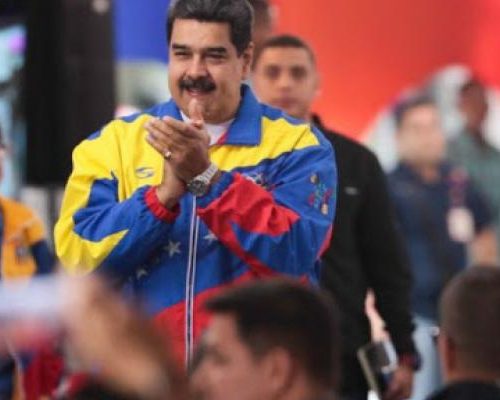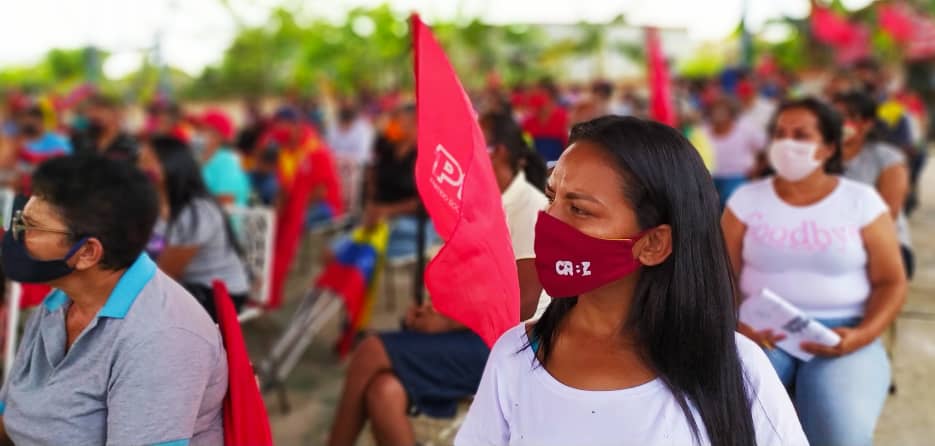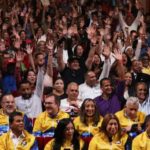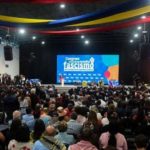“AS MEMBERS OF A COMMUNITY IN OUR TERRITORY, WE ARE PRACTICED AT IMPARTING AND PRODUCING KNOWLEDGE AND BUILDING EMANCIPATORY SELF-GOVERNMENT”.
THIS IS HOW THE MASTER’S STUDENT MARÍA ANGÉLICA CORREDOR SUMS UP THE SPIRIT OF CITIZEN POWER AND TRANSFORMATION IN VENEZUELA.
On the basis of the debates and proposals that emerged during the National Congress of Municipalities in February 2021, President Nicolás Maduro submitted to Parliament two bills responding to an old Communard demand: the Law of Communal Cities and the Law of Municipal Parliament.
President Maduro said: “I ask for the support of the National Assembly to transfer economic power and the concrete power of public services to the Communard People and to the Municipal Councils. I transferred 26,283 Petros to 1,000 Municipal Banks and 29,663 Petros to Municipal Textile Projects. The aim is to boost the new financial architecture of Citizen Power. The municipality is the new state”.
To better understand this stage in the Bolivarian Revolution, we publish two chapters.
Chapter 1 – reproduces the article by the Venezuelan political scientist Franco Vielma: “In-depth analysis of Chavismo’s Communitarian Commitment”. Chapter 2 – reproduces the article of the social movement Corriente Revolucionaria Bolivar and Zamora (CRBZ): “Citizen Power, Communal Cities and the Dynamization of the PSUV: Central Strategic Tasks”.
Posadists Today, 4.4.2021.
CHAPTER 1
IN-DEPTH ANALYSIS OF CHAVISMO’S COMMUNITARIAN COMMITMENT by FRANCO VIELMA, 18 Feb 2021
Following the discussions and proposals that emerged after the closing of the National Congress of Communes 2.0 on February 10, President Nicolás Maduro, who was very involved in the development of the event, handed over to Jorge Rodríguez, President of the Parliament, two bills that will be key for the coming political cycle: the Communal Cities Law and the Communal Parliament Law.
The consolidation of these bills, was part of the political campaign for the parliamentary elections and they have been expressly drafted by the communal teams that participated in the Congress with 698 proposals.
Of these, a total of 406 were registered in charge of the spokespersons of communes and communal councils, while 292 correspond to the representation of social movements.
Chavismo and the apparent incongruence of dollars and Communes:
Due to the timing of the news, there is an apparent incongruence between the Chavismo in power, which recently announced the relaxation of banking mechanisms to allow operations in dollars, and the same Chavismo that is making huge leaps towards the Communes.
Let us move out of this narrative and Manichean trap by analyzing the national reality.
Basically, in the context of the economic blockade against the country, the capacity of the State to arbitrate the internal economic factors and sustain the apparatus, as had been the tradition in 100 years of rentierism, has been significantly degraded. Now, the model for sustaining the economy and thus the core factor of the country’s policy, the rent, is failing, disfigured by the pressures of the blockade.
Such singularity in the Venezuelan political and economic framework has meant that the management of the State is now particularly marked by pragmatism, especially in the economic sphere, in ways that had not been known in more than 20 years of Chavism in power.
Chavismo has had to implement and tolerate a set of rule changes, based on superior factors and forces that it cannot control, precisely because the economic capacities of the State have been decimated. In this regard, it is worth highlighting not only the external blockade, but also the progress in the domestic economy of phenomena such as the partial dollarization of economic activities, as well as the flexibilizations in economic policy and mechanisms to revitalize the internal apparatus beyond the management of the State, which have been accepted by the government itself.
Hence, what some consider acts of “regression”, for the Chavista directorate are acts of congruence and pragmatism at the expense of the conditions imposed. For chavismo these conditions impose adaptation, or being overwhelmed by the circumstances of total economic hemiplegia imposed by the blockade.
In the same context, the launching of two projects of communal laws that have been demanded for years by the forces that have fought for the construction of the Communes in the country has taken place.
President Maduro has proclaimed that the Communes are features of the “new State”, which must germinate by strengthening the national political space, within a framework of resistance. “We have to go about building the forces of the future, the moral and new strength of the homeland. The communal forces, the popular forces, those of the working class. Rectifying where mistakes have been made,” he added.
He predicted that by this year, the goal of building at least 200 communal cities, according to the principles of the proposed law, will be consolidated. He spoke of the development vertices for the communal cities, among which he listed: the drafting of simple laws of service to the people. The second vertex is that of proximity public services, controlled by the popular power and also the role of the Communes in the productive activity.
In other words, the proposal consists of political and economic empowerment, developing self-management ways from the communes, in a framework of economic and financial aggressions that have broken the traditional forms of economic and political management in the country, namely, those that emerged with the rentier, representative, vertical and clientelistic State that has defined national life.
There is, by default, a recognition of the circumstances. Chavismo understands that in some areas it has to yield while in others it has to advance and that these situations are imposed by the moment and by gravitations that Chavismo cannot control, but rather must maneuver. Just as in a war scenario, which is what is happening in Venezuela, there is congruence between the apparent setbacks and the advances, since they are based on tactical purposes.
There is a recognition of the dismantling of the traditional rentier State, which demands a transformation of the forms of government and the acceleration of political and economic management mechanisms beyond the State.
Seen in this light, there are no incongruities. The national political and economic moment itself, with all its contradictions, has been propitious for a clear leap forward towards the Commune.
A strategic approach on several fronts:
The intention is ambitious, it consists of reverting from the depths, from the very entrails of the country, the local management models, not from the conditions of oil at 100 as it was intended in another era, but from the most exasperating conditions that the Venezuelan economy has known in its entire history.
Hence, political progress, country within country, is now a clearly strategic factor for Chavism. The collapsing rentier system will impose new forms of public management in the management of state services, in sensitive areas such as the distribution of domestic gas or access to drinking water.
It is also a fact that the diminished capacities of the State, the reduction of its institutional strength, now demand a concrete and empowered action, with faculties, of the organized sectors at the base to manage for and from the communities.
It is also relevant to mention that the desired national economic recovery, in view of the reduction of the State’s economic capacities, should not be left in the exclusive hands of private capital, if such a thing is possible, since this by nature can only recover itself, leaving little for national aspirations. Chavismo continues to look at the economic and productive potential of the Communes as incipient economic actors, but with the capacity to impact local economies, through solidarity criteria for the production and distribution of goods and services. This is another point to consider.
The launching of the Communal Parliament Law consists of a political empowerment that will be indispensable for the development of local life, to re-politicize and revitalize the protagonist participation as an unmistakable mark of Chavism. Next, the Law of Communal Cities will implement management mechanisms from and for the Communes, creating a habitat for the management of public services and the social production and flow of goods and services.
Along these lines, Maduro has bet on “oiling” the resource base for these efforts. He remarked that the induced devaluation in Venezuela, forces the State to use the Petro as an instrument, making another milestone in the national life and creating in Venezuela another enormous particularity: chavismo aspires to build spaces of local self-government, financing this great aspiration through the use of a sovereign cryptocurrency.
Perhaps the latter apparently does not mean much because of our tendency to trivialize national politics. But let’s look at it from two comparative references.
We know about Bitcoin and its bubble price, that in Denmark it is used to buy pizzas in delivery and that it has been known for days that it will be used to pay for a Tesla vehicle. Because of its characteristics, Bitcoin is often called a “counter-hegemonic instrument” in the face of global finance as we have known it. In a certain way it is, because of its technological denomination, but its contribution will be enormous for capitalism in the future.
What can we say then of the Petro and the capacity it could have to finance and favor the construction of socialism in the territory, self-management and deep democracy, from Venezuela, the country that in the entire western hemisphere is the greatest center of the pressures of the empire of our time.
The commitment is that in the medium term, the Communes and Communal Cities may conform a habitat for local political management, as an alternative to the bourgeois political organization models. Additionally, through the use of the Petro and its incorporation to daily operations, to channel the exchange of goods and services revitalizing the local economic space.
The congruence of these bills with the present situation of the country also reflects the evolution of the last few years. The adverse situation itself has driven these proposals. In Venezuela, the changes that have prospered since the peak of the economic situation have put an end to the paternal models of management, and the way has been opened to the management of public policy from the everyday, from the limitation of resources, one day at a time, from the permanent contingency and from the protagonism of the grassroots forces to execute them. In this item, the CLAP’s, UBCH’s, Communal Councils and the vanguard feminine political fabric in the communities have been the key to deal with the sorrows and demands of the population.
Hence, the natural forces of internal politics have allowed for this leap, which is a gamble for Maduro. It is to be understood, just at the beginning of an electoral year, where governors and mayors will be elected, which would mean a withdrawal of the forces of alternative management. For Maduro it is the opposite and that is another strategic front to consider.
This is a wager that will bear fruit, after vicissitudes and crossroads, when the dispute of the old State versus the emerging communal State is consummated. It will have setbacks, it will encounter obstacles, let us not doubt it. But it is based today on the accumulated experience and the experience that chavismo has had in the organization from the deepest part of the country.
FRANCO VIELMA – Posted by INTERNATIONALIST 360° on 18 FEB 2021 – Translation by Internationalist 360°
CHAPTER 2
THE POWER OF THE PEOPLE, COMMUNAL CITIES AND THE DYNAMIZATION OF THE PSUV: CENTRAL STRATEGIC TASKS,
by the National Coordination of the Revolutionary Current Bolivar and Zamora, 26.1.2021
We accompany and support the set of political and ideological initiatives that President Nicolás Maduro has been proposing, to the extent that all of them imply key aspects for the revival and deepening of the Bolivarian revolution. The fight against corruption, the deepening of revolutionary democracy with the promotion of communal cities and the search for “new methods for the party to assume a more critical, dynamic and active role”, make up three key axes to advance in a revitalizing and dynamizing strategic line of the political revolution. Let us look at them one by one.
The communal cities are an important step to advance in the historical objective of building a democratic society and in the transformation of the oligarchic State into a State based on the power of the people, with multiple and diverse forms of participation and direct exercise of power. However, we believe that the construction of these communal cities must start from certain bases, from concrete realities, not from paper, not from statistics that often do not correspond to reality.
Communal cities should not be decreed, nor imposed by bureaucratic instances, which does not mean that the State and the government should not play a central role in their conformation. What we want to say is that it is necessary to go through a previous process of re-promoting and strengthening the communal councils and communes, pillars on which the communal cities will be supported. Those of us who are involved in grassroots work know that, except for some referential experiences, their levels of organization, participation and empowerment are not adequate enough to suddenly propose higher levels of aggregation. It is not enough to achieve these optimum levels by adjusting them and re-electing spokespersons, which is an administrative response; it is a matter of building and executing an integral reinvigorating plan that solidifies these first two levels of organization in order to move on to more complex levels of aggregation of communal power. Otherwise, we run the risk of ending up with 200 communal cities as stated in the goal, but on paper, appropriated by cenacles of “spokesmen” in many cases imposed for the sole purpose of controlling the resources to be allocated to these communal cities.
The communal cities must start from a territorial diagnosis to evaluate their political, organizational and geographic viability. Where conditions exist to move forward, this should be done, but in those territories where they do not exist, it is necessary to consider plans aimed at creating these conditions. It is better to build model or referential experiences that can show the viability of this form of empowerment in a first phase, than to decree them in a flat and automatic way.
To move towards a more critical, dynamic and active PSUV, as the President proposes, is not only correct but a strategic task to be able to lead the revolutionary process towards the updating and revitalization needed for the construction of the democratic, ethical and humanist society proposed as a historical objective by the Bolivarian revolution, that is, an inclusive society, of collective welfare and egalitarian. It is about advancing towards the party of Chávez, a party that is an instrument of transformations, that understands the current character of the dispute, not only against imperialism but also the dispute of meanings, of emotions, the ethical battle, in short, the hegemonic battle.
It is urgent to overcome the logic of the party-transmission-belt for clientelism and assistentialism, so that the duality party/government becomes a transforming synergy [to create] powerful instruments to overcome the crisis we are suffering. This will only happen if there is a deep process of renewal, of formation of ethical and democratic leaderships, and of creation and application of internal mechanisms for this purpose.
If we advance in the deepening of popular power, in the active role of the people in our democracy, if we renew the party to make it more critical, more active in the truly transforming tasks (without ceasing to be an effective electoral instrument, obviously), to turn it into a more dynamic party as proposed, we can then be in better conditions to fight against corruption, against the ethical deviations that do so much damage to the country and, above all, to the possibility of achieving economic recovery, even if we can agree that the main cause is the criminal and illegal commercial and financial blockade.
With the power of the people, with an ethical and democratic party, we would have two powerful forces to defeat corruption, foreign aggression and to radically revitalise the Bolivarian revolution within the framework of Chávez’s perspectives.
For these reasons we, at CRBZ (1), believe that these initiatives proposed by President Maduro must be accompanied with enthusiasm and determination by all the Chavista forces. The Bolivar and Zamora Revolutionary Current is present, and from now on directs all its efforts, its will, the time and energy of its militancy to the achievement of these strategic tasks.
Let us go then, with the deepening of the power of the people and of revolutionary democracy, with the revitalization and dynamization of the PSUV[2], to fight the battle against corruption, against ethical deviations, for the political revolution, for the economic recovery and for the defeat of the blockade!
National Coordination of the Revolutionary Current Bolivar and Zamora
Article published on the CRBZ site on 26.1.21. The translation is that of Internationalist 360 Degrees published on the same date.
[1] CRBZ, http://www.crbz.org
[2] PSUV, Partido Socialista Unido de Venezuela founded under Hugo Chavez in 2008.

















